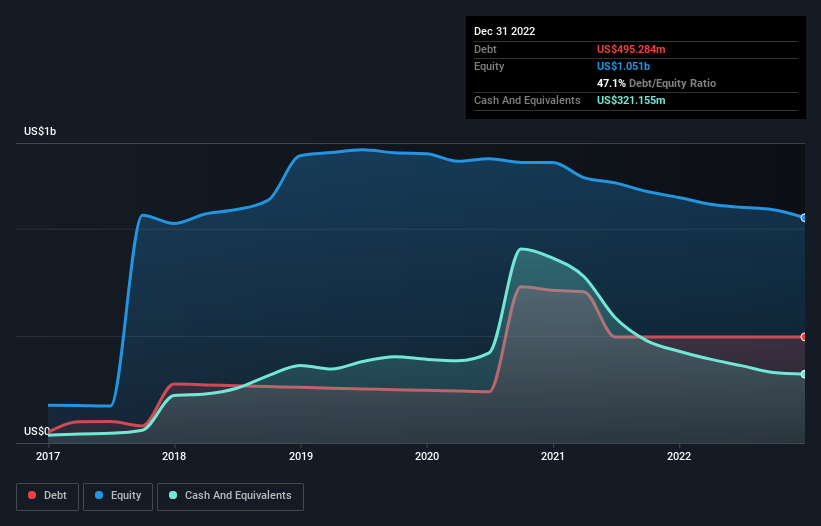- United States
- /
- Interactive Media and Services
- /
- NasdaqGS:ANGI
Angi (NASDAQ:ANGI) Is Carrying A Fair Bit Of Debt
The external fund manager backed by Berkshire Hathaway's Charlie Munger, Li Lu, makes no bones about it when he says 'The biggest investment risk is not the volatility of prices, but whether you will suffer a permanent loss of capital.' So it might be obvious that you need to consider debt, when you think about how risky any given stock is, because too much debt can sink a company. Importantly, Angi Inc. (NASDAQ:ANGI) does carry debt. But the real question is whether this debt is making the company risky.
When Is Debt A Problem?
Generally speaking, debt only becomes a real problem when a company can't easily pay it off, either by raising capital or with its own cash flow. In the worst case scenario, a company can go bankrupt if it cannot pay its creditors. However, a more usual (but still expensive) situation is where a company must dilute shareholders at a cheap share price simply to get debt under control. By replacing dilution, though, debt can be an extremely good tool for businesses that need capital to invest in growth at high rates of return. The first thing to do when considering how much debt a business uses is to look at its cash and debt together.
Check out our latest analysis for Angi
What Is Angi's Debt?
As you can see below, Angi had US$495.3m of debt, at December 2022, which is about the same as the year before. You can click the chart for greater detail. However, it also had US$321.2m in cash, and so its net debt is US$174.1m.

A Look At Angi's Liabilities
The latest balance sheet data shows that Angi had liabilities of US$281.8m due within a year, and liabilities of US$574.6m falling due after that. Offsetting this, it had US$321.2m in cash and US$93.9m in receivables that were due within 12 months. So it has liabilities totalling US$441.4m more than its cash and near-term receivables, combined.
Angi has a market capitalization of US$1.03b, so it could very likely raise cash to ameliorate its balance sheet, if the need arose. But we definitely want to keep our eyes open to indications that its debt is bringing too much risk. There's no doubt that we learn most about debt from the balance sheet. But it is future earnings, more than anything, that will determine Angi's ability to maintain a healthy balance sheet going forward. So if you want to see what the professionals think, you might find this free report on analyst profit forecasts to be interesting.
In the last year Angi wasn't profitable at an EBIT level, but managed to grow its revenue by 12%, to US$1.9b. We usually like to see faster growth from unprofitable companies, but each to their own.
Caveat Emptor
Over the last twelve months Angi produced an earnings before interest and tax (EBIT) loss. To be specific the EBIT loss came in at US$100m. Considering that alongside the liabilities mentioned above does not give us much confidence that company should be using so much debt. Quite frankly we think the balance sheet is far from match-fit, although it could be improved with time. However, it doesn't help that it burned through US$89m of cash over the last year. So in short it's a really risky stock. For riskier companies like Angi I always like to keep an eye on the long term profit and revenue trends. Fortunately, you can click to see our interactive graph of its profit, revenue, and operating cashflow.
When all is said and done, sometimes its easier to focus on companies that don't even need debt. Readers can access a list of growth stocks with zero net debt 100% free, right now.
New: Manage All Your Stock Portfolios in One Place
We've created the ultimate portfolio companion for stock investors, and it's free.
• Connect an unlimited number of Portfolios and see your total in one currency
• Be alerted to new Warning Signs or Risks via email or mobile
• Track the Fair Value of your stocks
Have feedback on this article? Concerned about the content? Get in touch with us directly. Alternatively, email editorial-team (at) simplywallst.com.
This article by Simply Wall St is general in nature. We provide commentary based on historical data and analyst forecasts only using an unbiased methodology and our articles are not intended to be financial advice. It does not constitute a recommendation to buy or sell any stock, and does not take account of your objectives, or your financial situation. We aim to bring you long-term focused analysis driven by fundamental data. Note that our analysis may not factor in the latest price-sensitive company announcements or qualitative material. Simply Wall St has no position in any stocks mentioned.
About NasdaqGS:ANGI
Angi
Angi Inc. connects home professionals with consumers in the United States and internationally.
Undervalued with excellent balance sheet.
Similar Companies
Market Insights
Community Narratives




